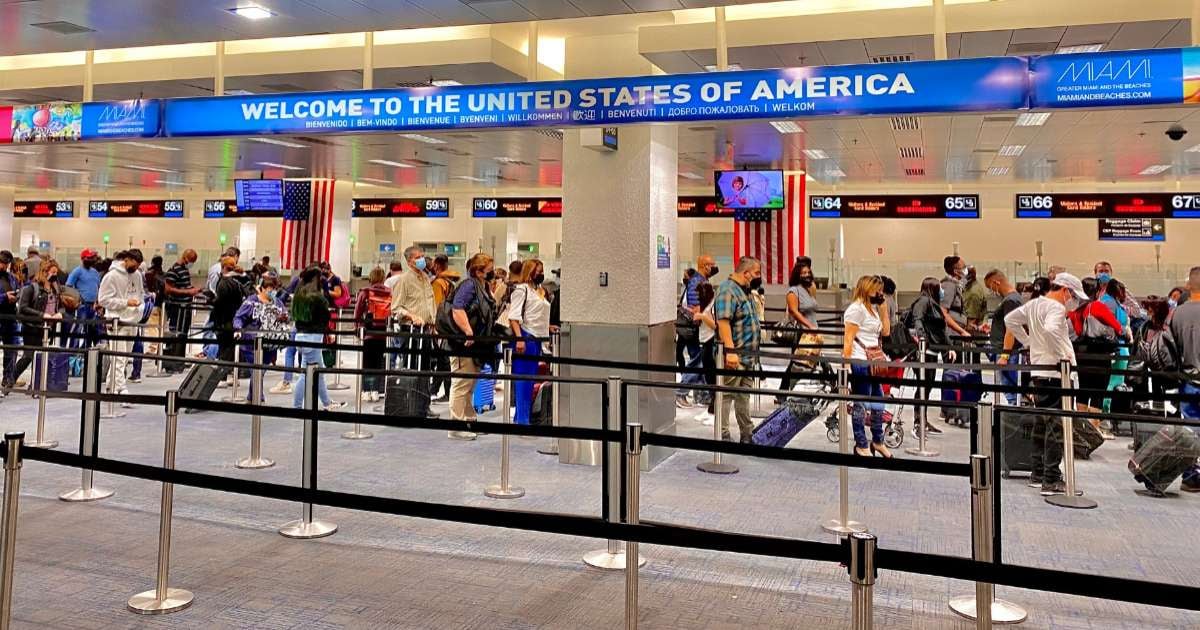The new immigration restrictions imposed by President Donald Trump have shaken the Cuban community in the United States, especially those who still dream of reuniting with their families or starting a new life far from authoritarianism and scarcity.
Reactions are mixed, and while some Cubans justify the measures for reasons of national security, others view them as a new barrier that hinders long-held hopes.
Starting Monday, June 9, Cuban citizens attempting to enter the United States with temporary visas, such as those for visitors or students, or who are in the process of obtaining residency, will face higher obstacles.
Cuba was added by the Trump administration to the list of countries with partial travel restrictions, on the grounds that it does not adequately cooperate with U.S. authorities and is a “state sponsor of terrorism.”
In Kentucky, where over 60,000 Cubans reside, the measures have sparked a heated debate. Darién Berríos, who left Cuba in 2007, supports Trump’s decision.
“We need to do something about it, because Cuba has sent many people in recent years to serve the regime from the United States”, he told the network WAVE News. “First, we must take care of our own home, and then of others”.
María Teresa Rodríguez, a Cuban refugee since 2009, also agrees with Cuba’s inclusion on the list. “Cuba does not cooperate with anyone unless there is an advantage for its government. They are enemies of humanity for everything they do against their people,” she stated.
Both agree that it is not about disdain for their own people, but rather a “necessary” measure to protect the country that now hosts them. “I have nothing against my people”, Berríos confirmed, “but this is for security”.
Luis Barrero, a Cuban in Miami, expressed a more nuanced opinion. “I believe that a Venezuelan and a Cuban should not be visiting the United States when there is such a significant dictatorship in their country. They should focus more on the dictatorship than on sightseeing”, he told BBC Mundo.
However, he made a distinction between cases of tourism and those of asylum. “If they come as political asylum seekers, that’s a different matter. There I do disagree [with restricting it].”
“They waited for years, and now they have to wait longer.”
Not everyone agrees. For Alberto, another Cuban living in Miami, the news is a harsh blow for those on the island who still dream of emigrating legally. “That is the policy of President Donald Trump, and it must be respected, right? Well, this news is important for the Cubans on the island. Just imagine, it’s like throwing a bucket of cold water on them”, he declared to BBC Mundo.
Julián Padrón, also a resident of Miami, was emphatic in his statement. “I am Cuban, and I believe this is a free country and a country of migrants, but I don’t think they should impose the restriction.”
The immigration attorney Duffy Trager harshly criticized the restrictions and warned about their human impact. “There are people who have been waiting for decades for their legal opportunity to enter. And now, if their turn comes and they have a valid visa, they simply will not be able to enter. This could extend another three and a half years or more,” he lamented.
According to data cited in the presidential proclamation, Cuba had a rate of illegal stay of 7.69% with tourist visas and 18.75% with student visas. However, Trager points out that the measure indiscriminately punishes many who do comply with the rules, nullifying years of sacrifice.
The new rules include some exceptions such as spouses and children under 21 years of age of U.S. citizens, as well as certain special cases like athletes competing in international events. However, for the majority of Cuban applicants, the outlook has become much more uncertain.
In short, Trump’s proclamation has also revealed a painful rift within the Cuban diaspora, where there are those who, having managed to arrive, advocate for stricter measures; and on the other side, those who are still waiting for an opportunity, now finding themselves trapped between two countries that close their doors.
In the midst of this tension, what is clear is that the Cuban exile is still marked by trauma, fear, and the struggle for survival. For some, the priority is to protect their new home; for others, it is not to forget that they too were, once, the ones knocking on the door seeking refuge.

